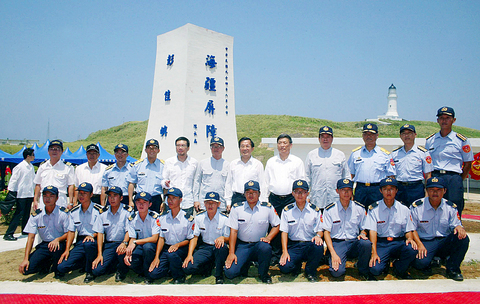Setting foot on Pengjia islet (彭佳嶼) as the first head of state from Taiwan to ever visit the nation's northernmost territory, President Chen Shui-bian (陳水扁) yesterday reiterated Taiwan's sovereignty claim over the Diaoyutai islands (釣魚台).
The Diaoyutais, about 141km from Pengjia, are at the center of a sovereignty dispute between Taiwan and Japan -- which calls them the Senkaku -- and a quarrel over fishing rights.
Accompanied by both Minister of National Defense Lee Jye (李傑) and chief of the Coast Guard Administration Hsu Hui-yu (許惠祐), Chen's high-profile visit to Pengjia yesterday was the second time in a fortnight he had visited Taiwan's remote territories, having visited the southerly Pratas Islands on July 28.

PHOTO: CNA
"The Diaoyutais belong to us, belong to Taiwan, there is no doubt about it ... I'm here to show our determination to protect our territory," Chen said.
The chain has, in recent months, became a thorn in the side of Taiwan-Japan relations after local fishermen held a large-scale demonstration last month to protest what they called unfair treatment at the hands of the Japanese coast guard.
Stating that Taiwan and Japan's conflicting claims to the Diaoyutais was a matter separate from that of fishing rights, the president said major local fishermen's associations have also thrown their support behind the government's "separate handling" stance and added that his administration would do whatever it could to secure the best possible benefits for local fishermen in negotiations with Japan.
Chen said that although the 15th round of Taiwan-Japan fishery talks in Tokyo on July 29 reached "no significant breakthrough" given the complexity and sensitivities of issues involved such as overlapping economic zones and conflicting territorial claims, "progress is considered being made so long as we continue to hold talk and keep talking."
"Taiwan, as a liberal, democratic and peace-loving country, is obliged to resolve international disputes through negotiations in line with international law and precedents and not use unilateral confrontational moves," Chen said.
Chen also said that Coast Guard Administration planned to build new bases on Pengjia to facilitate patrol missions and the monitoring of oil exploration disputes among neighboring countries, including Japan, China and South Korea, as well as expanding its policing area and providing better protection for fishermen.
The ownership of Pengjia is not disputed but there are competing claims to maritime areas between Pengjia and the Diaoyutais.
As part of a monument-unveiling ceremony in the islet, the president autographed copies of a new book published by the Coast Guard Administration to provide information about Taiwan's territorial waters and 200-mile exclusive economic zone.
The only one inhabited out of the three islets, Pengjia is guarded by military personnel and coast guard officers.

PREPAREDNESS: Given the difficulty of importing ammunition during wartime, the Ministry of National Defense said it would prioritize ‘coproduction’ partnerships A newly formed unit of the Marine Corps tasked with land-based security operations has recently replaced its aging, domestically produced rifles with more advanced, US-made M4A1 rifles, a source said yesterday. The unnamed source familiar with the matter said the First Security Battalion of the Marine Corps’ Air Defense and Base Guard Group has replaced its older T65K2 rifles, which have been in service since the late 1980s, with the newly received M4A1s. The source did not say exactly when the upgrade took place or how many M4A1s were issued to the battalion. The confirmation came after Chinese-language media reported

The Taiwanese passport ranked 33rd in a global listing of passports by convenience this month, rising three places from last month’s ranking, but matching its position in January last year. The Henley Passport Index, an international ranking of passports by the number of designations its holder can travel to without a visa, showed that the Taiwan passport enables holders to travel to 139 countries and territories without a visa. Singapore’s passport was ranked the most powerful with visa-free access to 192 destinations out of 227, according to the index published on Tuesday by UK-based migration investment consultancy firm Henley and Partners. Japan’s and

A Ministry of Foreign Affairs official yesterday said that a delegation that visited China for an APEC meeting did not receive any kind of treatment that downgraded Taiwan’s sovereignty. Department of International Organizations Director-General Jonathan Sun (孫儉元) said that he and a group of ministry officials visited Shenzhen, China, to attend the APEC Informal Senior Officials’ Meeting last month. The trip went “smoothly and safely” for all Taiwanese delegates, as the Chinese side arranged the trip in accordance with long-standing practices, Sun said at the ministry’s weekly briefing. The Taiwanese group did not encounter any political suppression, he said. Sun made the remarks when

BROAD AGREEMENT: The two are nearing a trade deal to reduce Taiwan’s tariff to 15% and a commitment for TSMC to build five more fabs, a ‘New York Times’ report said Taiwan and the US have reached a broad consensus on a trade deal, the Executive Yuan’s Office of Trade Negotiations said yesterday, after a report said that Washington is set to reduce Taiwan’s tariff rate to 15 percent. The New York Times on Monday reported that the two nations are nearing a trade deal to reduce Taiwan’s tariff rate to 15 percent and commit Taiwan Semiconductor Manufacturing Co (TSMC, 台積電) to building at least five more facilities in the US. “The agreement, which has been under negotiation for months, is being legally scrubbed and could be announced this month,” the paper said,